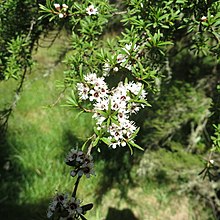Trachypepla cyphonias
| Trachypepla cyphonias | |
|---|---|

| |
| Illustration of male | |
| Scientific classification | |
| Domain: | Eukaryota |
| Kingdom: | Animalia |
| Phylum: | Arthropoda |
| Class: | Insecta |
| Order: | Lepidoptera |
| Family: | Oecophoridae |
| Genus: | Trachypepla |
| Species: | T. cyphonias
|
| Binomial name | |
| Trachypepla cyphonias | |
Trachypepla cyphonias is a species of moth in the family Oecophoridae. It is endemic to New Zealand and has been collected in Wellington and Taranaki. Larvae of this species have been reared from kānuka leaf litter. Adults are on the wing in December. This species is classified as "At Risk, Naturally Uncommon" by the Department of Conservation.
Taxonomy
[edit]This species was described by Edward Meyrick in 1927 using a male specimen collected by George Hudson in Wellington on the hills on the eastern side of Wellington Harbour in December.[3][4] Hudson discussed and illustrated the species in 1939.[5] The holotype specimen is held at the Natural History Museum, London.[4]
Description
[edit]
Meyrick described the species as follows:
♂ 15 mm. Head ochreous-whitish. Palpi ochreous-whitish, second joint dark fuscous except apex, terminal joint with two dark fuscous rings. Antennal ciliations 1. Thorax ochreous-whitish, shoulders fuscous. Forewings elongate, termen very obliquely rounded; purplish-fuscous, darker-sprinkled, costa suffused darker; an ochreous-whitish spot on base of dorsum; first discal stigma formed of black and white raised scales, plical small, of black raised scales, beneath first discal, second discal included in a curved transverse linear white mark edged with raised black scales; a minute whitish dot on costa before middle; a suffused whitish triangular dot on costa beyond 2⁄3, whence a very indistinct irregular curved series of undefined dots of blackish irroration runs to tornus: cilia greyish, with series of ochreous-whitish points. Hindwings grey, paler near base; cilia ochreous-whitish, with faint pale greyish lines.[3]
Distribution
[edit]This species is endemic to New Zealand.[2] Along with its type locality, this specimen has also been collected at Egmont.[6]
Biology and life history
[edit]
This species is on the wing in December.[5] Larvae have been reared from trapped litter in kānuka.[7]
Host species and habitat
[edit]The preferred habitat of this species is open scrub.[5]
Conservation status
[edit]This species has been classified as having the "At Risk, Naturally Uncommon" conservation status under the New Zealand Threat Classification System.[1] Brian H. Patrick suggested that this species is in need of further research.[8]
References
[edit]- ^ a b Hoare, R.J.B.; Dugdale, J.S.; Edwards, E.D.; Gibbs, G.W.; Patrick, B.H.; Hitchmough, R.A.; Rolfe, J.R. (2017). "Conservation status of New Zealand butterflies and moths (Lepidoptera), 2015" (PDF). New Zealand Threat Classification Series. 20: 8.
- ^ a b "Trachypepla cyphonias Meyrick, 1927". www.nzor.org.nz. Landcare Research New Zealand Ltd. Retrieved 2018-05-26.
- ^ a b Meyrick, Edward (1927). "Descriptions of New Zealand Lepidoptera". Transactions and Proceedings of the New Zealand Institute. 58: 313–316.
- ^ a b Dugdale, J. S. (1988). "Lepidoptera - annotated catalogue, and keys to family-group taxa" (PDF). Fauna of New Zealand. 14: 106. Archived from the original (PDF) on 22 July 2019. Retrieved 26 May 2018.
- ^ a b c Hudson, G. V. (1939). A supplement to the butterflies and moths of New Zealand. Wellington: Ferguson & Osborn. p. 450. OCLC 9742724.
- ^ "Moth, Oecophoridae". Puke Ariki Museum Libraries Tourist Information Taranaki New Zealand. Retrieved 2018-05-26.
- ^ "NZTCS - Lepidoptera consultations". www.doc.govt.nz. 2013. Retrieved 26 May 2018.
- ^ Brian H. Patrick (1994), Coastal butterflies and moths of Wellington and South Wairarapa. (PDF), Wikidata Q110426707, archived from the original (PDF) on 13 December 2021

